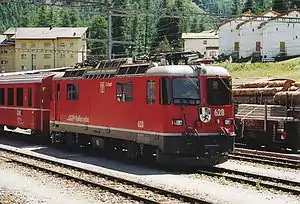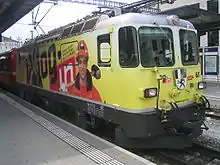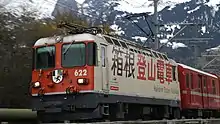Rhaetian Railway Ge 4/4 II
The Rhaetian Railway Ge 4/4 II is a class of metre gauge Bo′Bo′ electric locomotives operated by the Rhaetian Railway (RhB), which is the main railway network in the Canton of Graubünden, Switzerland.
| Rhaetian Railway Ge 4/4 II | |||||||||||||||||||||
|---|---|---|---|---|---|---|---|---|---|---|---|---|---|---|---|---|---|---|---|---|---|
 | |||||||||||||||||||||
| |||||||||||||||||||||
| |||||||||||||||||||||
| |||||||||||||||||||||
| |||||||||||||||||||||
The class is so named because it was the second class of locomotives of the Swiss locomotive and railcar classification type Ge 4/4 to be acquired by the Rhaetian Railway. According to that classification system, Ge 4/4 denotes a narrow gauge electric adhesion locomotive with a total of four axles, all of which are drive axles.
History

The 23 Ge 4/4 II locomotives, numbered 611 to 633, were placed in service in 1973 (first series) and 1984 (second series). The last example of the second series, named Zuoz and numbered 633, was completed only in 1985. The Ge 4/4 II replaced the Ge 6/6 I (Crocodile), which was becoming less and less reliable.
Ever since its delivery, the Ge 4/4 II class has been in service on the whole of the core network of the Rhaetian Railway, at the head of both passenger trains and freight trains. Since 1997, the class has also served on the Arosa Line following its conversion to 11 kV 16+2⁄3 Hz AC. The Ge 4/4 IIs can work double headed in multiple-unit train control operation. In combination with control cars of the series BDt 1751-58, acquired in 1999, they can also operate shuttle trains.
Since 1999, some units have been given new square headlights upon being technically revised, but their appearance has otherwise remained the same.
From 2004, all 23 locomotives were fully modernised as part of a refit program, involving, amongst other things, the replacement of the analogue control electronics with modern computer supported instrumentation. The last four locomotives to be updated in this program were nos. 612, 619, 627 and 632, in 2008.
As of 2018 rumours has it that Ge 4/4 II no. 611 Landquart is to be saved for possible preservation in Rhb Historic.
Technical details
In their external appearance, the Ge 4/4 II locomotives, supplied by Swiss Locomotive and Machine Works (SLM) and Brown, Boveri & Cie (BBC), are reminiscent of the Re 4/4II of the Swiss Federal Railways.
The electrical componentry is nevertheless markedly different: in the Re 4/4 II locomotives, controlled rectifiers (phase fired controllers) made of thyristors and diodes supply the traction motors with wavy direct current.
In a Bo′Bo′ wheel arrangement, the Ge 4/4 II locomotives have a top speed of 90 kilometres per hour (56 mph) and weigh 50 tonnes (49 long tons; 55 short tons). Their power output is 1,700 kilowatts (2,300 hp) at 52 kilometres per hour (32 mph).
The permissible towing capacity of the class is 185 tonnes (182 long tons; 204 short tons) on a 4.5% gradient, and 245 tonnes (241 long tons; 270 short tons) on a 3.5% gradient; with double heading it is a maximum of 400 tonnes (390 long tons; 440 short tons).
Livery

The first series of the class, nos. 611–620, were originally green liveried, but have since been reliveried in the still contemporary Rhaetian Railway standard red. The second series, numbered 621–633, was delivered already painted in the red livery.
Each individual locomotive in the class is named after a town along the Rhaetian Railway network in Graubünden. The relevant name is applied in white letters to the right and left sides near the top of the locomotive. Each locomotive's traffic number (between 611 and 633) is featured on both of its ends, and low down on both of its sides. Adjacent to its name, each locomotive also bears the coat of arms of the community after which it was named.
List of locomotives
The following locomotives of the Ge 4/4 II class are in service with the Rhaetian Railway:
| List of Ge 4/4 II locomotives of the Rhaetian Railway | |||||
| Road number | Name | Coat of arms | Commissioning | Status | Notes[1] |
| 611 | Landquart | 30.05.1973 | in service, will be saved for possible preservation for forseable future, | login promotional livery (New Designe 2017) | |
| 612 | Thusis | 20.07.1973 | in service | ||
| 613 | Domat/Ems | 31.07.1973 | in service | ||
| 614 | Schiers | 14.08.1973 | in service | ||
| 615 | Klosters | 03.09.1973 | in service | RE-Power (Rhätia Energie) promotional livery | |
| 616 | Filisur | 28.09.1973 | in service | Siemens promotional livery | |
| 617 | Ilanz | 05.10.1973 | in service | LGB model trains' 50th anniversary promotional livery | |
| 618 | Bergün/Bravuogn | 05.11.1973 | in service | flyedelweiss.com livery | |
| 619 | Samedan | 03.12.1973 | in service | Südostschweiz - Tageszeitung livery | |
| 620 | Zernez | 19.12.1973 | in service | 100 Years Bever-Scuol livery | |
| 621 | Felsberg | 09.02.1984 | in service | Traveco Transporte AG livery | |
| 622 | Arosa | 08.03.1984 | in service | Livery of the Japanese partner railway, the Hakone Tozan Railway | |
| 623 | Bonaduz | 05.04.1984 | in service | since December 17, 2013, livery of the 125 Years of the RhB 1889-2014 | |
| 624 | Celerina/Schlarigna | 10.05.1984 | in service | 50000 Facebook Fans livery | |
| 625 | Küblis | 01.06.1984 | in service | ||
| 626 | Malans | 28.06.1984 | in service | ||
| 627 | Reichenau-Tamins | 02.08.1984 | in service | 100 Years Chur-Arosa livery | |
| 628 | S-chanf | 30.08.1984 | out of service | Locomotive 628 was badly damaged in a collision with a stone near Tavanasa in the Vorderrhein Valley on May 14, 2019. The damaged locomotive was dismantled and finally scrapped on October 10, 2019. | |
| 629 | Tiefencastel | 04.10.1984 | in service | Neubau Albulatunnel livery | |
| 630 | Trun | 31.10.1984 | in service | 100 Years Chur-Disentis livery | |
| 631 | Untervaz | 30.11.1984 | in service | ||
| 632 | Zizers | 12.12.1984 | in service | [lower-roman 1] | |
| 633 | Zuoz | 30.01.1985 | in service | Radiotelevisiun Svizra Rumantscha (RTR) livery | |
See also
- A further development of this class, the FO Ge 4/4 III, was acquired in 1979 by the Furka Oberalp Bahn.
- History of rail transport in Switzerland
- Rail transport in Switzerland
References
- On 5 January 2007, locomotive 632 (Zizers) was badly damaged by a landslide on the Chur – Ilanz section, after it became derailed near the Valenda station, and swept away parts of an avalanche gallery. According to a statement from the Rhaetian Railway rolling stock department, the locomotive was to be rebuilt with a new body on the old chassis. At the same time, the standard modifications applied under the refit program to all locomotives of the Ge 4/4 II class were to be carried out. Since 30 March 2008, the locomotive has been back on the rails, but at that time still had to undergo various test procedures before it could return to service.[2]
- "Fahrzeugwerbung" [Vehicle advertising] (PDF). Haribu website (in German). Retrieved 8 December 2010.
{{cite web}}: External link in|work= - RhB Rollmaterial Photo Gallery: RhB Ge 4/4 II 632 wieder auf voller Fahrt
Further reading
- Finke, Wolfgang; Schweers, Hans (1998). Die Fahrzeuge der Rhätischen Bahn. Band 3 Lokomotiven, Triebwagen, Traktoren 1889–1998 [The Motive Power of the Rhaetian Railway Vol 3 Locomotives, Railcars, Tractors 1889–1998]. Aachen: Verlag Schweers + Wall. ISBN 3894941057. (in German)
- Schönborn, Hans-Bernhard (2009). Die Rhätische Bahn Geschichte und Gegenwart [The Rhaetian Railway History and Present]. München: GeraMond. ISBN 9783765471629. (in German)
.jpg.webp)
